The RFS programme is closing but food systems transformation carries on
22 June 2023
The 12 country projects are connected by the Regional Hub, a cross-cutting unit whose core focus is to coordinate the country projects, ensure cross-project learning and collaboration, and monitor and assess programmatic progress.
Partners
AGRA, Bioversity International – CIAT Alliance, Conservation International, FAO, ICRAF, UNDP, UN Environment
Resilient Food Systems’ Regional Hub is a cross-cutting unit whose core focus is to coordinate across the 12 implementing countries to ensure learning and scaling-up of sustainable technologies and interventions on smallholder farms. In collaboration with a range of partners and via existing platforms in sub-Saharan Africa, the Regional Hub helps address institutional and policy barriers for the inclusion of ecosystem services approaches into policies and investments for improved and sustainable smallholder agriculture and food value chains.
The focus is on facilitation of dialogue, models, metrics, and practices which bridge the agricultural and environmental agendas at various scales. This involves, where possible, strengthening of existing partnerships and institutional frameworks, learning and scaling successful methods and facilitating the creation and strengthening of multi-stakeholder science and policy platforms in sub-Saharan Africa.
The Regional Hub relies on the efforts of a range of partners, each responsible for contributing towards one of the Hub’s four core objectives:
1. Create and strengthen integrated institutional frameworks and mechanisms for scaling up proven approaches.
Regional Hub partners UN Environment and FAO help address institutional and policy barriers to the inclusion of ecosystem services approaches into policies and investments for improved and sustainable smallholder agriculture and food value chains.
2. Identify and scale up successful integrated approaches for making food systems more sustainable and resilient.
Regional Hub partners UNDP and AGRA use a value chain (VC) approach to identify and scale up best practices for “greening” food value chains, while FAO provides capacity development and technical support to countries for strengthening agricultural advisory services.
3. Monitor and assess global environmental benefits and agro-ecosystem resilience.
Regional Hub partners Conservation International, UN Environment and Bioversity International – CIAT Alliance are responsible for monitoring the global environmental benefits of the programme and strengthening the capacity of country projects to apply appropriate tools and practices for monitoring and assessment.
4. Coordinate, report, and perform general management functions across RFS projects to enhance programmatic impact, visibility, and coherence.
Within the Regional Hub, the Programme Coordination Unit, run by ICRAF, coordinates the linkages between all 12 country projects and is responsible for programme-wide knowledge management and communication activities.
Each RFS project conducts activities that fall under common thematic areas within the programme. Explore each project theme relevant to the Regional Hub project below to see which activities are being implemented under each theme.
Learn more about the activities being implemented under the Regional Hub. Stay up-to-date on key workshops, events, and lessons learned throughout the programme.
Relevant resources
We have a growing library of reports, briefs, case studies, media, tools and guidelines. Explore all resources related to the Regional Hub to get greater insight into our programme activities.
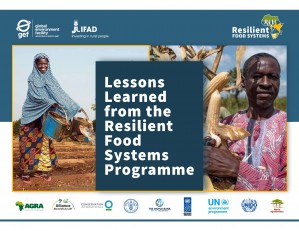
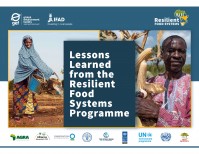
Integrated Approach Pilot (IAP) programmes were conceived as part of the Global Environment Facility (GEF) 2020 Strategy to test the delivery of integrated approaches that address discrete, timebound, complex, global environmental challenges. In its Sixth Replenishment Cycle (GEF6), three IAPs were funded: Sustainable Cities, Taking Deforestation out of Commodity Supply Chains, and Fostering Sustainability and Resilience for Food Security in Sub-Saharan Africa, also known as the Resilient Food Systems (RFS) programme.
The RFS programme serves as an outstanding example of different partners and countries with distinct mandates joining forces to pursue a shared objective, leveraging their respective strengths to transform food systems in Africa. It highlights the significance of clearly articulating the programme’s vision, establishing a well-defined division of labour, and delineating roles and responsibilities from the outset, forming the foundation for an accountability framework. Moreover, the RFS underscores the importance of adopting a nexus approach that integrates food security, agriculture, environment, socio-economic, and climate considerations.
This holistic approach recognizes the interconnectedness of these sectors and the need for holistic solutions. The RFS’s systems-based approach brings together multiple partners at different levels and fosters information flows in both directions, supporting collaboration and knowledge sharing.
This publication presents some of the main lessons learned from the RFS programme, which lasted for six years between 2017 and 2023. It provides a reflection on the implementation, lessons learned, and observations around the key components of the RFS. The programmatic value-add of the RFS and the manner with which it was harnessed during implementation is conveyed through case studies drawn from the experience of the country projects across these components.
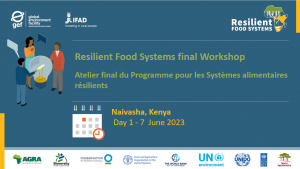
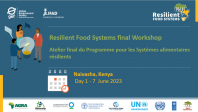
The Resilient Food Systems programme Final Workshop and Science-Policy Learning Day took place in Naivasha, Kenya from 6-8 June 2023. This slide deck comprises the presentations from Day 1 of the Workshop on 7 June under the following programme:
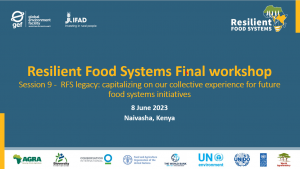
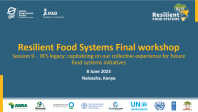
The Resilient Food Systems programme Final Workshop and Science-Policy Learning Day took place in Naivasha, Kenya from 6-8 June 2023. This slide deck comprises the presentations from Day 2 of the Workshop on 8 June concerning Session 9: RFS legacy: capitalizing on our collective experience for future food systems initiatives.